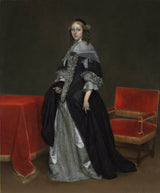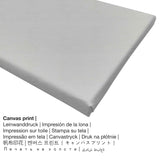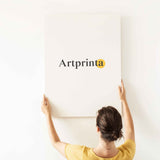Gerard ter Borch, 1665 - Portrait of a Woman - fine art print
Taxes incluses. Frais de port calculés au paiement.
Summarization of the replica
This classic art artwork called Portrait of a Woman was painted by the baroque artist Gerard ter Borch. The original had the following size - Framed: 87,5 x 77 x 7 cm (34 7/16 x 30 5/16 x 2 3/4 in); Unframed: 63,3 x 52,7 cm (24 15/16 x 20 3/4 in) and was painted on the medium oil on canvas. It is part of the The Cleveland Museum of Art's digital art collection, which is located in Cleveland, Ohio, United States of America. We are happy to reference that this public domain masterpiece is being provided with courtesy of The Cleveland Museum of Art. Creditline of the artwork: The Elisabeth Severance Prentiss Collection. On top of that, alignment of the digital reproduction is portrait and has a ratio of 1 : 1.2, meaning that the length is 20% shorter than the width. Gerard ter Borch was a painter, whose art style can primarily be assigned to Baroque. The artist lived for 64 years, born in the year 1617 and deceased in the year 1681.
Select the product material you will hang up in your home
We offer a range of different sizes and materials for every product. We allow you to pick your favorite size and material among the following product individualization options:
- Aluminium dibond (metal print): This is a metal print manufactured on aluminium dibond material with an impressive depth effect. The Aluminium Dibond Print is your best introduction to art prints made with aluminum. For your Aluminium Dibond print, we print the selected work of art right onto the aluminium white-primed surface. The white & bright components of the original work of art shimmer with a silky gloss but without glare. Colors are bright and vivid in the highest definition, the details appear crisp and clear, and you can notice a matte appearance of the product.
- Canvas print: A canvas print, which shall not be mistaken with a painting on a canvas, is a digital copy printed directly on cotton canvas material. Your canvas of your favorite artwork will provide you with the opportunity of transforming your new art print into a large size work of art. A canvas print has the advantage of being low in weight, which means that it is quite simple to hang up your Canvas print without the help of extra wall-mounts. A canvas print is suitable for any kind of wall.
- The poster print (canvas material): Our poster is a printed canvas paper with a slightly roughened surface texture, that reminds the original masterpiece. Please bear in mind, that depending on the size of the canvas poster print we add a white margin 2-6 cm round about the painting in order to facilitate the framing.
- Acrylic glass print (with real glass coating on top): The acrylic glass print, which is sometimes labelled as a UV print on plexiglass, will convert your favorite original artwork into wonderful home décor. Furthermore, the acrylic print forms a distinct alternative option to canvas or aluminium dibond fine art prints. The artwork is custom-made with the help of state-of-the-art UV print machines. With an acrylic glass art print contrasts and small painting details become exposed because of the very fine tonal gradation in the picture. The plexiglass with real glass coating protects your chosen art replica against light and external influences for many years to come.
Important information: We try whatever we can in order to depict the products as precisely as possible and to display them visually. Nonetheless, the colors of the print products, as well as the print result may differ marginally from the presentation on the device's monitor. Depending on the screen settings and the condition of the surface, not all color pigments will be printed as realistically as the digital version. Bearing in mind that all our fine art prints are processed and printed by hand, there may also be slight discrepancies in the motif's size and exact position.
Product specs
| Product classification: | wall art |
| Reproduction method: | reproduction in digital format |
| Manufaturing technique: | UV direct print |
| Origin of the product: | manufactured in Germany |
| Stock type: | on demand |
| Proposed product use: | home design, art collection (reproductions) |
| Image orientation: | portrait alignment |
| Aspect ratio: | 1 : 1.2 |
| Implication of the image aspect ratio: | the length is 20% shorter than the width |
| Materials: | metal print (aluminium dibond), canvas print, acrylic glass print (with real glass coating), poster print (canvas paper) |
| Canvas print (canvas on stretcher frame) sizes: | 50x60cm - 20x24", 100x120cm - 39x47", 150x180cm - 59x71" |
| Acrylic glass print (with real glass coating) size options: | 50x60cm - 20x24", 100x120cm - 39x47", 150x180cm - 59x71" |
| Poster print (canvas paper) size variants: | 50x60cm - 20x24", 100x120cm - 39x47" |
| Aluminium dibond print options: | 50x60cm - 20x24", 100x120cm - 39x47" |
| Frame: | without frame |
Piece of art details
| Work of art title: | "Portrait of a Woman" |
| Artwork classification: | painting |
| Generic term: | classic art |
| Artwork century: | 17th century |
| Year of creation: | 1665 |
| Artwork age: | more than 350 years |
| Artwork original medium: | oil on canvas |
| Dimensions of the original artwork: | Framed: 87,5 x 77 x 7 cm (34 7/16 x 30 5/16 x 2 3/4 in); Unframed: 63,3 x 52,7 cm (24 15/16 x 20 3/4 in) |
| Museum / location: | The Cleveland Museum of Art |
| Location of museum: | Cleveland, Ohio, United States of America |
| Museum website: | The Cleveland Museum of Art |
| License type: | public domain |
| Courtesy of: | The Cleveland Museum of Art |
| Creditline: | The Elisabeth Severance Prentiss Collection |
Artist overview
| Artist name: | Gerard ter Borch |
| Jobs: | painter |
| Classification: | old master |
| Styles: | Baroque |
| Life span: | 64 years |
| Born: | 1617 |
| Year of death: | 1681 |
© Copyright of | Artprinta (www.artprinta.com)
Additional specifications from the museum's website (© - The Cleveland Museum of Art - www.clevelandart.org)
Every detail of his subject’s elaborate costume is skillfully recorded: glittering jewels, filmy lace, knots of ribbons, heavy black silk, and shimmering white satin. The ability to recreate satin’s luster was Gerard ter Borch’s particular trademark: he used fine flicks and sweeps of the brush, occasionally adding and wiping away tiny bits of paint to make the white fabric appear to shine. Ter Borch offset the profusion of costume detail by deliberately isolating the figure within a spare setting, allowing us to appreciate the woman’s cool composure. Although her identity is not known, she was undoubtedly a member of the wealthy Dutch elite.














